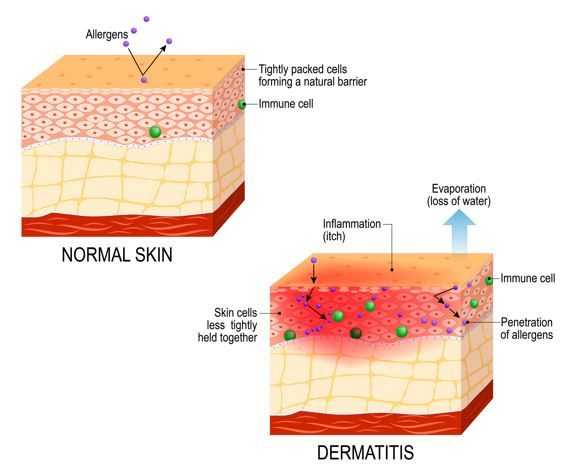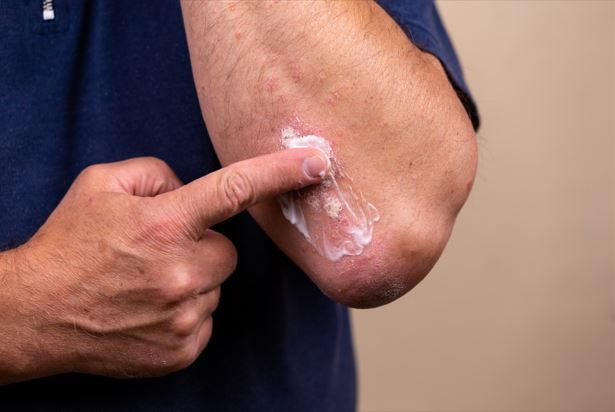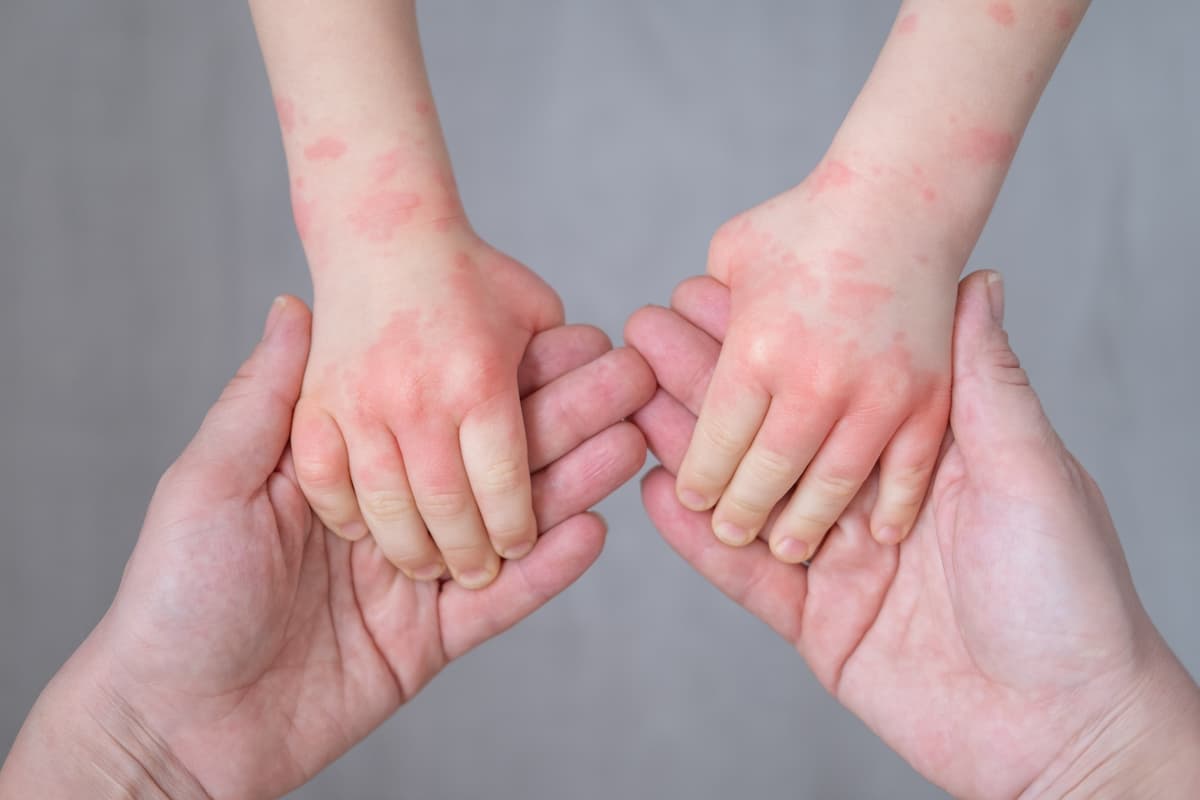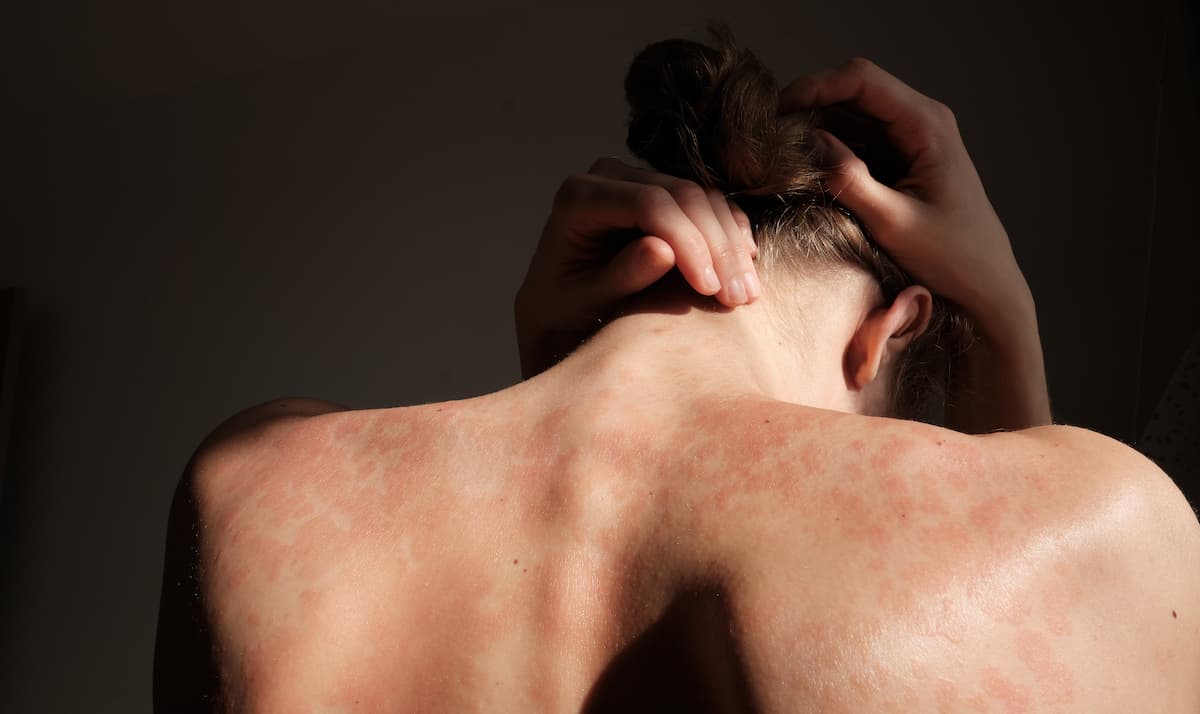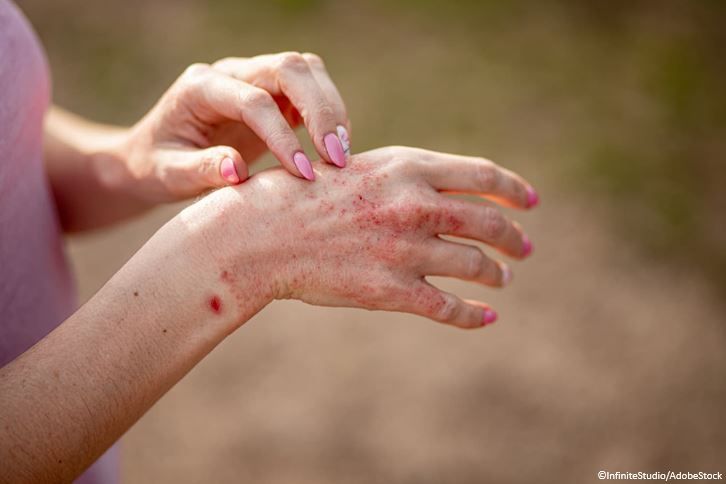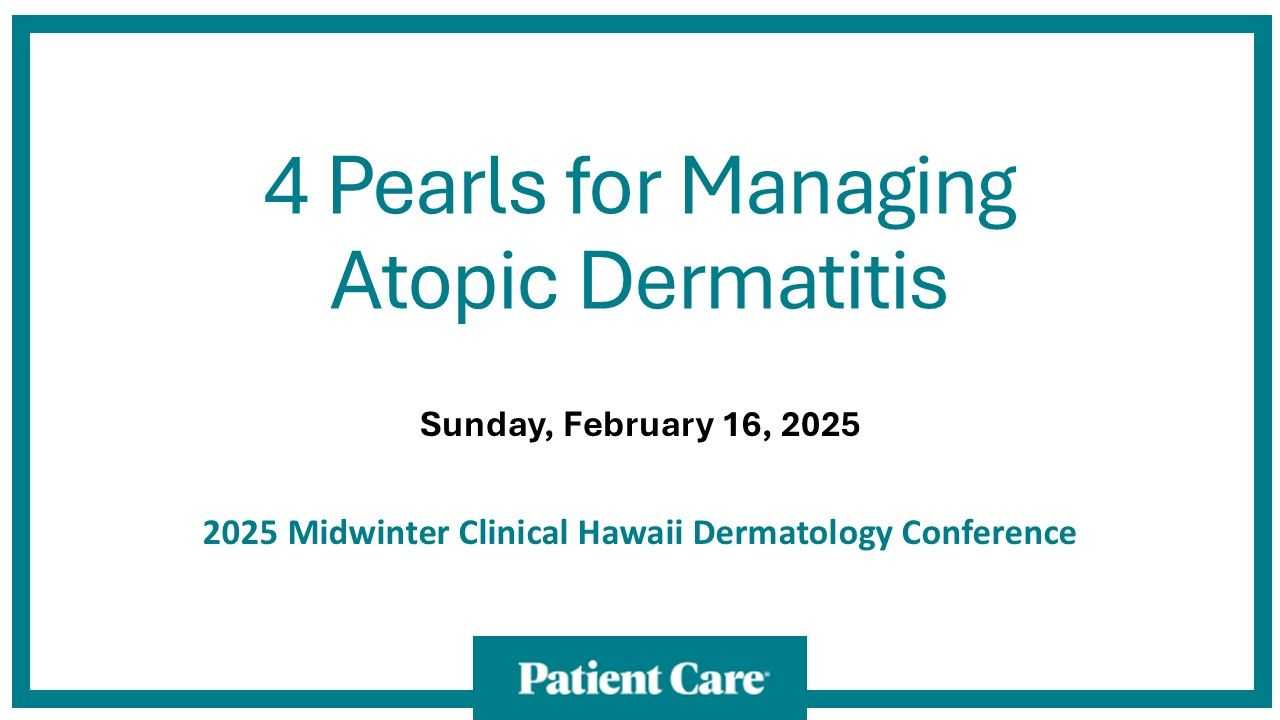Essential Resources
Provider Information
Patient Information

Atopic Dermatology Quiz Challenge
Test your knowledge of atopic dermatitis with this quiz and enter for a chance to win a $500 amazon gift card. Show your smarts about pathophysiology, treatments like PDE4 inhibitors, and management strategies
Dupilumab and Other Monoclonals Rank Highly for Moderate-to-Severe Atopic Dermatitis, Network Meta-Analysis Shows
A new meta-analysis reveals monoclonal antibodies, including dupilumab, outperform placebo in treating moderate-to-severe atopic dermatitis.
Kymera's Oral STAT6 Degrader KT-621 Shows Biologic-Like Activity in Early Atopic Dermatitis Trial
KT-621 achieved deep STAT6 degradation and strong 4-week EASI and itch reductions, offering a potential new oral option for moderate–severe AD and other Th2 inflammation-driven disease.
Atopic Dermatitis Signs and Symptoms for Referral: Physical and Emotional Expertise
Primary care is the ideal setting for management of atopic dermatitis, but certain scenarios, both physical and psychological, call for expert referral.
5 Novel Mechanisms Reshaping Atopic Dermatitis Treatment and the Phase 2-3 Clinical Trials That Support Them
Novel AD therapies targeting OX40, IL-13, IL-36, IL-22, and IL-2 pathways show promise for disease modification and extended dosing intervals in phase 2-3 trials.
Atopic Dermatitis Treatment Preferences: Age and Severity Guide Therapy Selection in Youth
Treatment goals for atopic dermatitis among youth are diverse, emphasizing the need for tailored approaches based on age and disease severity, a new study suggests.
Novartis' Oral Targeted BTKi Treatment Approved for Chronic Spontaneous Urticaria in Adults
Remibrutinib is the first oral BTK inhibitor for chronic spontaneous urticaria, with a dual mechanism of action that blocks 2 key autoimmune mechanisms.
Atopic Dermatitis: The Pipeline and Clinical Approaches That Could Transform the Standard of Care
Patient Care tapped the rich trove of research and expert perspectives from the Revolutionizing Atopic Dermatitis 2025 conference to create a snapshot of the AD care of the future.
Investigational IL-2 Pathway Agonist Rezpegaldesleukin Shows Promise in Phase 2b REZOLVE-AD Trial
The findings highlight rezpegaldesleukin's novel broad-based Treg mechanism, suggesting it may be a potent option with potential for disease modification in atopic dermatitis.
Emma Guttman-Yassky, MD, PhD, Outlines Phase 3 SHUTTLE Program with Rocatinlimab for Atopic Dermatitis
EADV 2025: Guttman-Yassky presented data from the phase 3 ROCKET-IGNITE trial and highlights its importance in the context of the global ROCKET development program.
OX40 Inhibitor Rocatinlimab Shows Significant Response in Combination with Topical Therapy for AD
EADV 2025: Phase 3 ROCKET-SHUTTLE results showed the T-cell rebalancing therapy significantly improved AD signs and symptoms in treatment-experienced adults.
Roflumilast Data Showcased Across Diverse Skin Conditions and Age Groups at EADV 2025
EADV 2025: Data will highlight the PDE4 inhibitor's efficacy across diverse populations and 3 common skin conditions: seborrheic dermatitis, atopic dermatitis, and psoriasis.
OX40 Antagonist Amlitelimab Meets All Primary and Secondary Endpoints in Phase 3 Atopic Dermatitis Trial
Sanofi's amlitelimab, dosed every 4 or 12 weeks, was superior to placebo in efficacy and skin clearance, with efficacy increasing throughout the treatment period.
Positive Topline Results on Long-Term Safety Reported for Rocatinlimab in Moderate to Severe Atopic Dermatitis
Rocatinlimab offers promise as a novel T-cell rebalancing therapy that targets the OX40 receptor, with maintenance dosing as infrequently as every 8 weeks.
AI-Generated Dermatologic Images Show Poor Diagnostic Accuracy, Underrepresent Skin of Color
In response to the prompt, "Generate a photo of a person with [skin condition]," 3 of 4 generative AI models significantly underrepresented diverse skin tones.
FDA Approves Delgocitinib, First Treatment for Adults With Moderate to Severe Chronic Hand Eczema
The nonsteroidal topical pan-JAK inhibitor provides a potent treatment option for adults with CHE who have not responded to corticosteroids or cannot tolerate them.
Atopic Dermatitis Flare Frequency May Predict Future Disease Severity, According to New Findings
Atopic dermatitis flares should be factored in to an assessment of disease severity and prognosis, the authors note, and a threshold established for acceptable frequency.
Turn Therapeutics Launches First Clinical Trial to Assess Topical IL-36 Inhibitor for Atopic Dermatitis
GX-03 has proven effective in preclinical trials, reducing disease severity by more than 50% vs placebo. Data from the current study are expected by year end.
Tralokinumab Update: Positive 16-Week Interim Results Reported for ADHAND Trial in Adults with Hand Eczema
Tralokinumab met key trial endpoints with no new safety signals in treatment of moderate-to-severe hand eczema, in adults who are candidates for systemic therapy.
Apogee Hopes Raised by Phase 2 Data for APG777 to be a Best-In-Class for Atopic Dermatitis
The investigational IL-13 inhibitor showed topline EASI-75 of 66.9% and reduced injection frequency in part A of the APEX phase 2 clinical trial.
Mental Health Burden in Atopic Dermatitis: Study Identifies Key Risk Factors for Anxiety and Depression
Depression and anxiety affect as many as 1 in 4 people with AD, with pruritus, sleep disorders, education level, and comorbidities identified as independent risk factors.
Why Is Early Treatment of Atopic Dermatitis So Important? Mona Shahriari, MD, Says It Could Change a Life
Atopic dermatitis is not just "another rash on the schedule. It could be the reason that patient doesn't leave the house," Shahriari says.
Arcutis Begins Study of Roflumilast Cream 0.05% in Infants with Atopic Dermatitis
Arcutis Biotherapeutics announced today the enrollment of the first patient in the phase 2 INTEGUMENT-INFANT trial.
Atopic Dermatitis Treatment: What Matters Most to Children, Adolescents, Young Adults, and Caregivers?
Treatment goals for atopic dermatitis among youth are diverse, emphasizing the need for tailored approaches based on age and disease severity, a new study suggests.
Roflumilast Topical Foam 0.3% Approved to Treat Plaque Psoriasis in People Aged 12 Years and Older
Itch relief in clinical trials was rapid with the nonsteroidal foam; it is applied once daily with no limitations on body area or duration of use.
Atopic Dermatitis Treatment Caution: Long-Term Oral Corticosteroid Use Ups Cardiovascular and Thrombotic Risks
The potential cardiovascular impact of prolonged oral corticosteroid therapy in the AD population observed in this study confirms longstanding cautions.
LEO Pharma Announces Positive Preliminary Phase 2b Findings for Temtokibart in Atopic Dermatitis
The IL-22FA1 antagonist achieved positive outcomes for the primary endpoint based on percentage change in EASI from baseline to week 16 for 3 highest doses, according to LEO.
Advances and Insights in Atopic Dermatitis Management
This comprehensive publication explores the current landscape and emerging therapies in the treatment of atopic dermatitis, with a particular focus on the use of topical phosphodiesterase-4 (PDE4) inhibitors. It includes insights into immune dysregulation in AD, limitations of conventional therapies, and evolving treatment options aimed at improving patient outcomes and adherence.
Millions of US Adults Have Multiple Forms of Eczema, Study Finds
Nearly 1 in 10 US adults have eczema, with 18% experiencing multiple eczema conditions, researchers from the National Eczema Association reported.
Burden of Moderate to Severe Atopic Dermatitis Weighs Heavily on Children and Adolescents: Real-World Analysis
The burden of disease was particularly pronounced among adolescents, including significantly greater impact on quality of life and psychosocial interaction.
The Toll of Atopic Dermatitis is More than Skin Deep: Q & A with Harvard Child Psychologist Jennifer LeBovidge, PhD
Awareness of the psychological burden of eczema is improving, LeBovidge says, but if clinicians don't address mental health, patients and families will suffer in silence.
Does it Itch? Is it Painful? Is it Dry? Dermatoses Symptoms Don't Lie
Raj Chovatiya, MD, PhD, MSCI, actually said symptoms "never" lie so, particularly in patients with skin of color, if skin signs aren't clear, ask about the patient's experience.
In Patients with Skin of Color, Lebrikizumab for Atopic Dermatitis Gets High Marks for Treatment Satisfaction
In individuals with skin of color with AD, lebrikizumab was associated with improved QoL and importantly with high rates of patient-reported treatment satisfaction.
Atopic Dermatitis Update: Roflumilast 0.15% Cream Shows Long-Term Safety and Efficacy Plus Benefit with Proactive Use
Improvement in AD signs and symptoms continued through 56 weeks of treatment with the PDE4 inhibitor including when used just twice weekly as prophylaxis.
Dermatology Therapeutics: Updates for Primary Care from AAD 2025
Research included new findings on topical and systemic treatments for atopic dermatitis, psoriasis, alopecia areata, and other chronic skin disorders.
Early-Onset Atopic Dermatitis Significantly Impacts Psychosocial Development, Wellbeing Throughout Adult Life
The impact of childhood onset AD on adult psychosocial experience is far reaching and profound according to findings from the Scars of Life Survey.
Contact Dermatitis: Expert Insights on First-Line and Emerging Therapies
JiaDe 'Jeff' Yu, MD, discusses first-line therapies, emerging biologics, and the potential of molecular biomarkers for improved diagnosis.
Patient Benefit Index Complements Traditional Psoriasis Outcome Measures, Study Finds
Findings showed that improved skin clearance and reduced anxiety and depression significantly influenced perceived patient benefit.
sNDA for Roflumilast Cream 0.05% for the Treatment of AD in Children Aged 2 to 5 Years Gets FDA Nod
The FDA has set a PDUFA target action date for October 13, 2025, according to Arcutis Biotherapeutics.
Late Breakers in Atopic Dermatitis: Highlights and Previews with Alexandra Golant, MD
From the revolutionary approval of dupilumab to the promise of potential disease modification with OX40 inhibitors, Golant provided a wide-ranging update of the treatment space.
4 Pearls for Managing Atopic Dermatitis
From black tea compresses to effective mind-body interventions for symptom control, Peter Lio, MD, shares 4 pearls for effective AD management.
10 Dermatology Tips for Primary Care
The dermatologic tips offered in this short slide show come from 4 renowned professionals and reflect their subspecialties.
Atopic Dermatitis Treatments Up Close: Biologics, JAK Inhibitors, and Cytokines, Oh My
Atopic dermatitis management will be the topic of a debate over treatment with biologics and JAK inhibitors and in a focused session on the role of IL-13 in the chronic skin disease.
Dupilumab Drug Survival Rates Superior to Those for Upadacitinib and Tralokinumab in Atopic Dermatitis: Large-Scale, Real-World Data
A first large-scale comparison of length of treatment with advanced AD therapies also identified reasons for discontinuation and examined prior use of biologics and JAK inhibitors.
When is It Time to Refer? A Dermatologist Considers Atopic Dermatitis Treated in Primary Care
Up to 80% of atopic dermatitis is managed in primary care but some patients will need a higher level of care. Dr Mona Shahriari discusses factors that point to referral.





